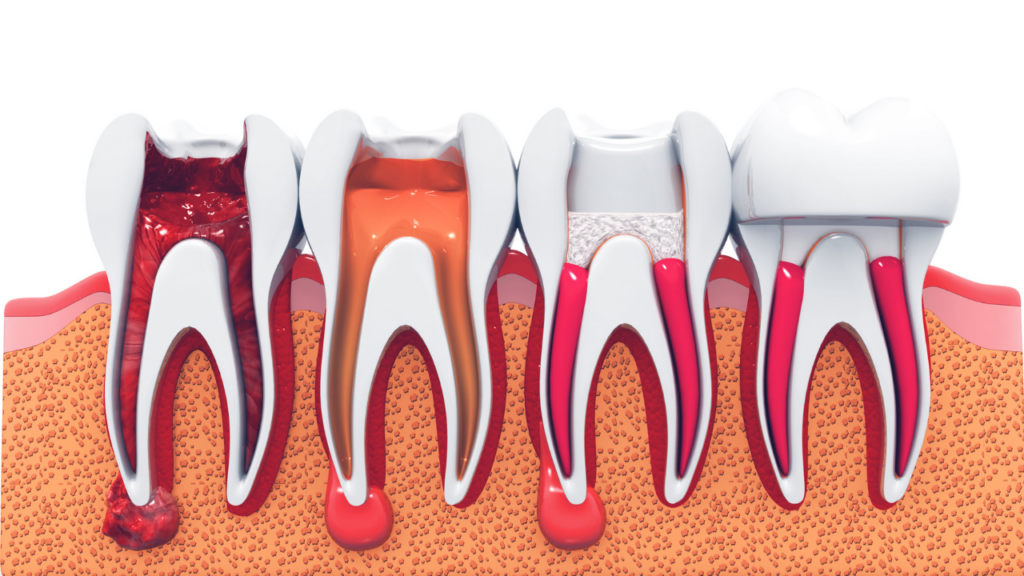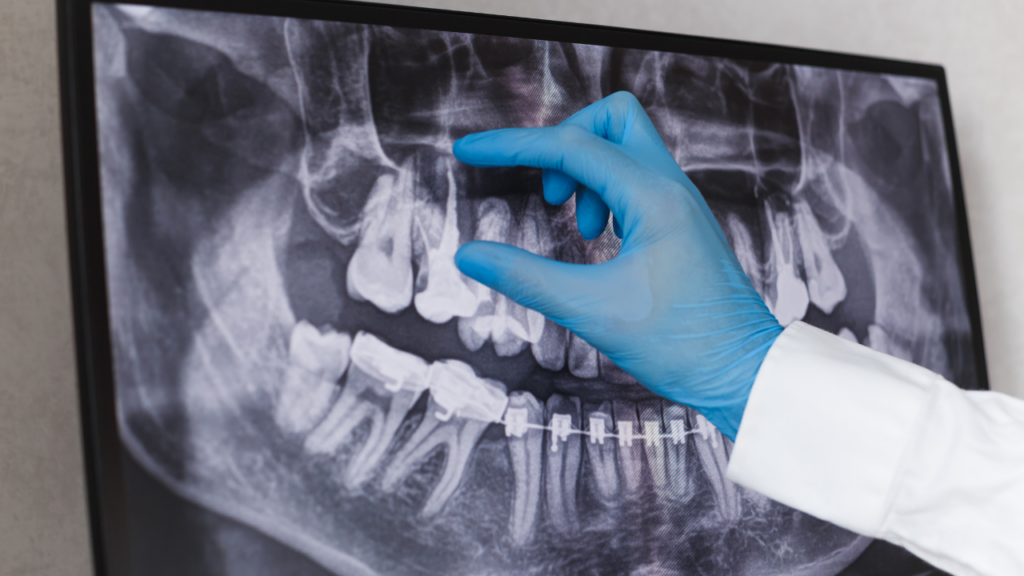Table of Contents
Exercise Daily – If you have pain after root canal how long is the first question that comes to your mind. Because a root canal is a serious treatment, it is typical to have discomfort after it. A root canal is a procedure that includes extensive cleaning within the canals. It may irritate the nerves and tissues in the surrounding area.
The discomfort shouldn’t linger indefinitely. An actual root canal intends to alleviate the discomfort associated with a rotting or cracked tooth, not to cause it. It is typical to suffer mild to moderate discomfort for a few days after a root canal procedure.
If you have any discomfort beyond this stage, your dentist may recommend further cleaning of the canals or other treatments.
The initial phase of recuperation
It used to be that root canals were very unpleasant. This is one of the reasons why individuals have hung back from such operations in the past. The use of pain-relieving methods by dentists may help to lessen the amount of discomfort you encounter throughout the operation.
Before the procedure starts, your dentist will provide a local anesthetic to alleviate any discomfort. Although you may experience some pressure during the cleaning, you should not experience any discomfort throughout the treatment.
Following the root canal procedure, you may feel slight discomfort and sensitivity as the local anesthetic wears off. Pain after root canal how long has something to do with the cleaning procedure.

In the course of the cleaning procedure, your dentist creates a tiny incision in the crown of the tooth. Then, it removes the unhealthy pulp from inside the tooth’s pulp chamber. While it may be painful, any pain or sensitivity experienced after a root canal should subside within a few days.
Because the pain associated with a root canal is often minimal, you will most likely simply need over-the-counter pain pills. Acetaminophen (Tylenol) and ibuprofen are examples of such medications.
Before taking these drugs, you should consult with your doctor. This is to ensure that they will not conflict with any vitamins or prescriptions that you are currently taking.
You should also avoid chewing hard foods soon after a root canal procedure since this might cause further discomfort.
5 Common Reasons You Have Tooth Pain after Root Canal
Despite the fact that this surgery is quite efficient at alleviating pain, some people still feel tooth discomfort. In this article, we’ll discuss five of the most prevalent reasons why this happens.
Post-Procedure Inflammation Causes Tooth Pain After Root Canal Treatment
A major reason for post-root canal tooth pain is inflammation. It may be caused by the treatment itself or by an infection that has caused the dental ligament to become inflamed. Inflammation is one of the most prevalent causes of post-root canal tooth pain.
In some instances, the swelling will reduce within a few days or weeks after the root canal. However, the discomfort will subside on its own after the procedure. Pain after root canal how long depends on the extent of inflammation.
Infection
A root canal is often done to remove diseased pulp from within the tooth. Hence, it’s conceivable that some germs remain after the surgery. It might result in infected tissue and more discomfort. If this occurs, seek medical attention immediately.
When your immune system targets and eliminates the germs, the condition should correct itself. However, if the problem continues, your doctor or dentist may prescribe antibiotics.
Oversized Fillings
A rubber-like substance is used to replace the empty area left by your dentist after the pulp has been removed. If an excessive amount of filling material is utilized, on the other hand, the tooth will sit higher in the mouth, causing discomfort whenever you bite down.
Despite the fact that this condition will not cure on its own, your dentist may simply correct the situation by modifying the filling.
An Incomplete Root Canal
There are certain teeth, particularly molars, that may have several canals. It’s conceivable for a dentist to overlook one or more of these canals during a root canal treatment. In these instances, the underlying cause of the pain is rarely addressed.
You will continue to experience discomfort even after having a root canal. A similar scenario occurs when you have a damaged nerve within a tooth that has to be removed. You may still suffer pain when the tooth comes into touch with heat, cold, or an acidic substance.
Damage to the Surrounding Tissue
Tissue damage can occur during a root canal procedure if bacteria is accidentally injected into the surrounding tissue. Pain after root canal how long depends on the damage and its extent.
If too much filling material is used and flows past the root tip, or if a file used for cleaning slips beyond the root tip and pokes into the tissue will cause pain. In these instances, the discomfort will subside as soon as the injured tissue has healed.

When it comes to treating issues caused by damaged or infected pulp, root canal therapy is a very successful treatment. This operation is also quite helpful in alleviating tooth discomfort.
But if your tooth pain continues after the root canal treatment, there are a number of common concerns. In most circumstances, tooth pain will subside on its own. However, if the discomfort is severe or lasts longer than five days, it is best to see a dental expert as soon as possible.
When should you seek assistance?
The discomfort associated with root canal treatment should diminish with time. If you are still experiencing discomfort or swelling, you should schedule an appointment with your dentist. The majority of patients need one to two sessions in order to have a successful root canal.
If the situation is serious, you may need more cleaning sessions. Pain after root canal how long that comes and goes might be an indication of this.
If you’re using any over-the-counter pain relievers, you should notice a reduction in your symptoms. Otherwise, your doctor may prescribe ibuprofen or narcotic pain medicines that are only available with a prescription. These are only intended to be used on a temporary basis.
Once your tooth has been fully healed, your dentist may recommend that you have a crown placed on top of it. Metal, porcelain, and gold are all possible materials for them. The goal here is to avoid further harm to a tooth that is already in a vulnerable state.
Pain may be a transient side effect of getting acclimated to a freshly put crown, and it is normal.
Treatment of pain after root canal
Pain that persists after a root canal should be discussed with your dentist. There are a variety of options available for managing pain after a root canal procedure other than taking medicines temporarily.
Avoid hard and crunchy meals
It is essential that you take good care of your teeth, and you should avoid hard and crunchy meals. Smoking cessation may also be beneficial.
Try stress-relieving activities
You could even think about stress-relieving hobbies as a way to control your discomfort. Meditation, yoga, and tai chi are all disciplines that may help you to divert your attention away from your discomfort.
Use ice pack
Applying an ice pack might help to relieve and calm the discomfort.
Make use of a saltwater gargle
After having root canals, saltwater may aid in the prevention of infection and the alleviation of discomfort. To gargle with a teaspoon of salt in a glass of warm water, repeat the process two to three times each day.
Use elevated pillows
Elevated pillows should be used when sleeping. Elevating your head stops your gums and nerves from hurting as a result of tooth extraction.
Tips for maintaining good oral health
Good oral hygiene habits might assist to decrease the discomfort associated with a recent root canal. This also determines pain after root canal how long and how often.
Moreover, they may help your new crown survive for many years while simultaneously preserving all of your remaining teeth. Take into consideration the following suggestions:
- Avoid eating items that are too firm, particularly immediately after a root canal procedure.
- At the very least, brush your teeth twice a day. Make careful to use gentle circular strokes with your toothbrush to clean your teeth without bothering them. Because of the recent root canal, you’ll want to exercise extra caution around the tooth.
- Flossing once a day may assist to prevent subsequent infections from occurring.
- Reduce the number of sugary meals and beverages you eat on a daily basis.
- To help keep your teeth healthy and free of infection, make frequent dental cleaning appointments.
Frequently Asked Questions
Is it normal to have pain 2 weeks after root canal?
It is not normal to have severe or prolonged pain 1-2 weeks after treatment. A root canal treatment that fails and leaves you with a severe, sharp pain that lasts for more than a week indicates that the infection has returned to the tooth, which is not normal.
Determine the pain after root canal how long has it been disturbing you, and consult your dentist. If you have severe, sharp pain or pain that lasts for more than a week, your root canal treatment has failed and the infection is still present in the tooth.
Why does my tooth still hurt after a root canal?
The tissue around the gums continues to swell or become inflamed: Even if the dentist has removed the nerve root from the tooth, there are still tiny nerves in the ligaments and tissue around the tooth. They cause swelling and inflammation to persist.
When this region becomes inflamed, such as after a dental operation, the nerve endings in this location may also experience pain.
Why does my root canal hurt more at night?
When you lay down to sleep, more blood is able to flow to your brain, allowing you to sleep better. Greater blood circulation implies more tooth discomfort than you would experience if you were standing still.
This is due to the fact that the increased blood flow puts pressure on the affected tooth and causes it to throb.
Can a root canal tooth hurt months later?
Even teeth that have undergone root canal therapy may be kept for a lifetime if they are cared for properly. Occasionally, however, a tooth that has been treated may not heal completely. It might become sore or infected months or even years after the treatment was completed.
Moreover, it is possible to get a second chance if your tooth did not heal properly or developed new complications. It also contributes to pain after root canal how long will it persist.
How do I know if my root canal failed?
- Tenderness or swelling
- Increased tooth mobility
- Pain on biting
- A blister or pimple-like bump inside the mouth
Take Away
A successful root canal procedure may result in minor discomfort for a few days after the procedure. For as long as you maintain appropriate dental hygiene, this should just be a transient problem that will go away.
If the discomfort persists for more than three days, you should schedule an appointment with your dentist.
When a tooth is extracted, your dentist may replace it with a bridge, partial denture, or implant. It is a less invasive option than a root canal. Typically, this is a time-consuming and costly procedure that requires many visits to your doctor.
A root canal is likely to result in reduced discomfort over time if you are a good candidate for the procedure. According to the American Association of Endodontists, having a root canal increases your chances of being pain-free by six times compared to not having one.
If you had pain after a root canal, share your experience, and how did you relieve it?











